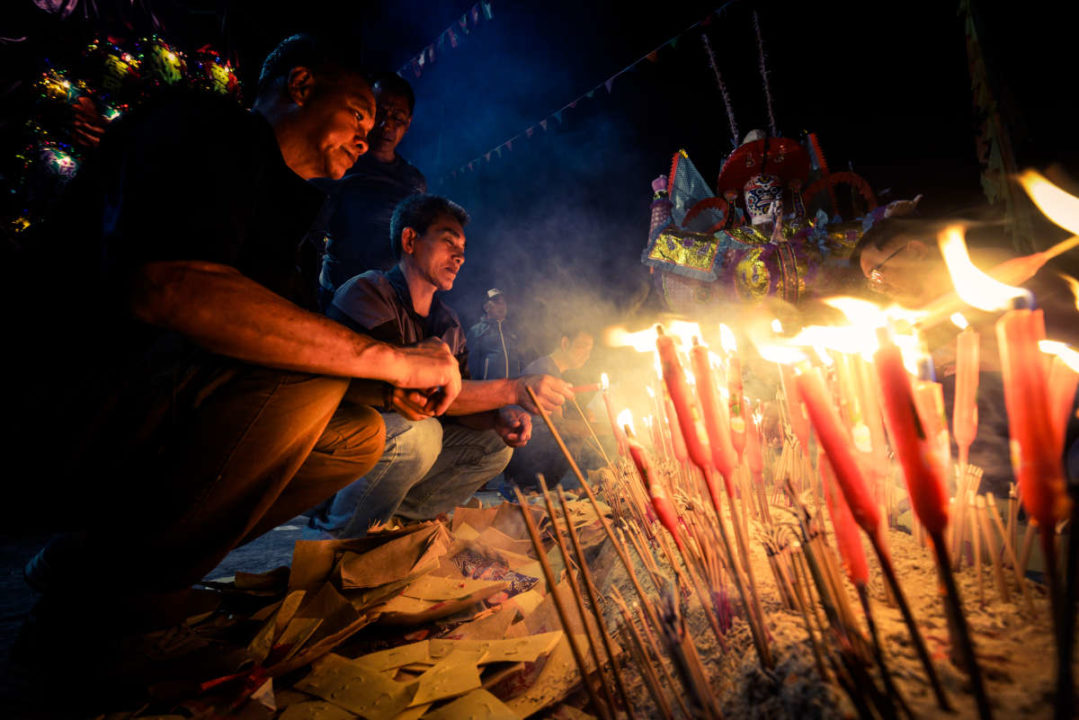Like many cultures around the world, Chinese people observe important customs surrounding the dead and their spirits. In Hong Kong and China, as well as other East Asian countries influenced by Chinese beliefs, it is believed that unsettled ghosts leave their spiritual realm in the seventh lunar month to visit the living. During this so-called Ghost Month in Hong Kong, there is a main festival day called Hungry Ghost Festival.
What is Hungry Ghost Festival?
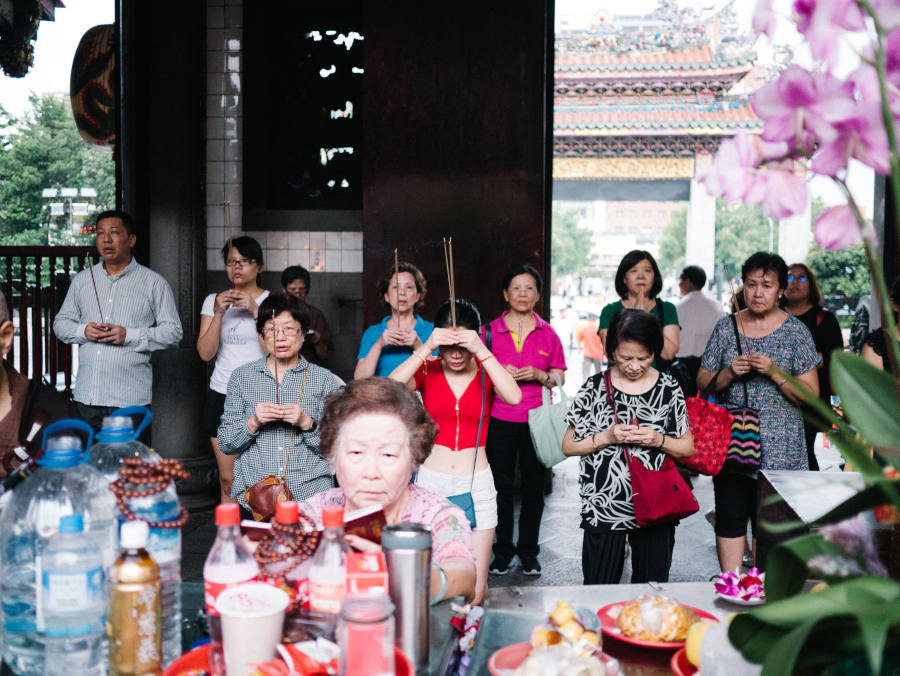
Hungry Ghost Festival (盂蘭節, pronounced yu lan jit in Cantonese and yú lán jié in Putonghua) is a festival celebrated on August 30, 2023 that focuses on paying tribute to the spirits of ancestors, as well as other unknown ghosts, as they wander the physical realm. Ritual practices are observed during the entire seventh month in the lunar calendar, which is from August 17 to September 14 this year. This period is also called Ghost Month (鬼月, pronounced gwai yut) and the 15th day of the lunar month is considered the apex of the festival period.
This special time, called Zhongyuan Festival in Taoism, Yulan Festival in Buddhism, or just Ghost Festival, may seem similar to Halloween as it’s a festival about ghosts. But in fact, East Asian people believe that during this month the gates of the afterlife open and troubled ghosts wander around the streets of the living.
Why do spirits wander the earth during Yulan Festival?
As the spirits roam the physical world, they visit their descendants because they haven’t received a proper send-off or been remembered well enough after their death. During the entire month, there are ceremonies and rituals to appease, feed, and entertain these spirits. Along with providing offerings like food and faux money, people also avoid doing certain things in order to avoid upsetting the ghosts.
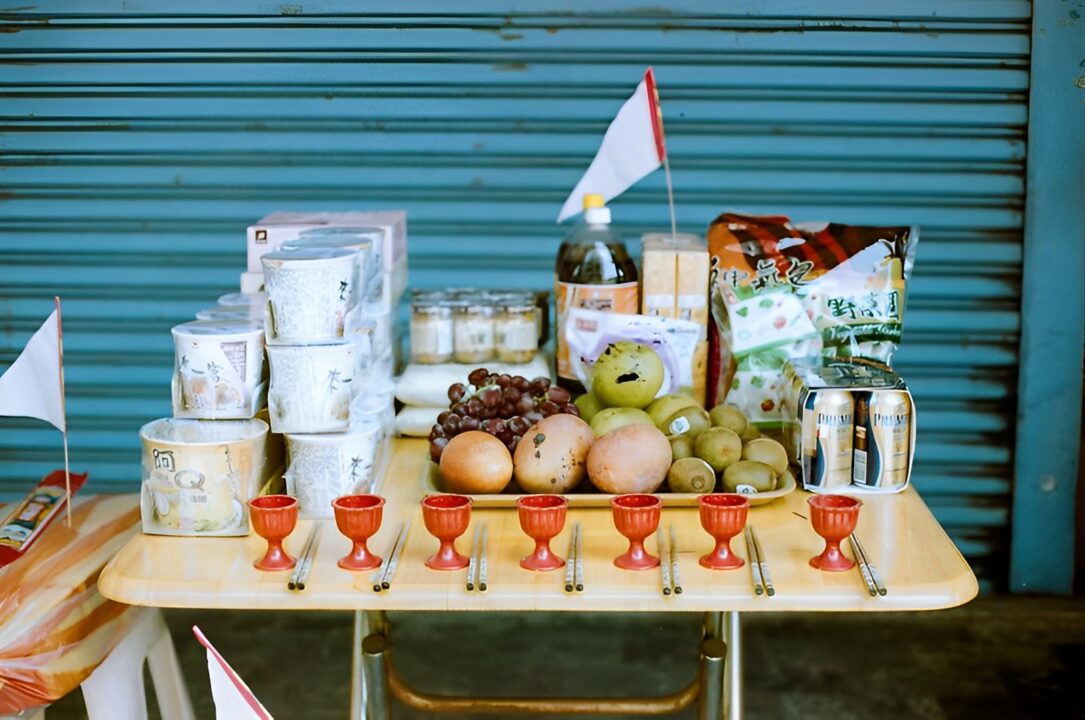
People practice these customs out of tradition to keep the relations between the living and the dead peaceful and to help the spirits pass back into their own realm. There isn’t an entirely documented history that clearly lays out the origins of this festival, but these are the basic principles behind the ritual practices. Today, people still hold the principles to be true and follow the rituals as they’ve been taught to.
How did Hungry Ghost Festival start?
Different origin stories for this festival time are told: the Mulian story is common in Chinese Buddhism and the story of ghost trials is a well-known story in Taoism.
In the Buddhist origin story, a close disciple of Syakamuni Buddha named Mulian (目連) helped save his mother from hell. His mother, a vegetarian, was sentenced to hell when she accidentally drank soup cooked with meat. Mulian cared for his deceased mother and tried to look for her in the afterlife by offering food to her. However, the food was taken away by hungry ghosts around her. He sought help from Buddha, who taught Mulian to chant and give sacrificial offerings in order to descend to hell and help his mother. People are touched by the kindness exemplified in this story and follow the offering ritual as a blessing to their ancestors.
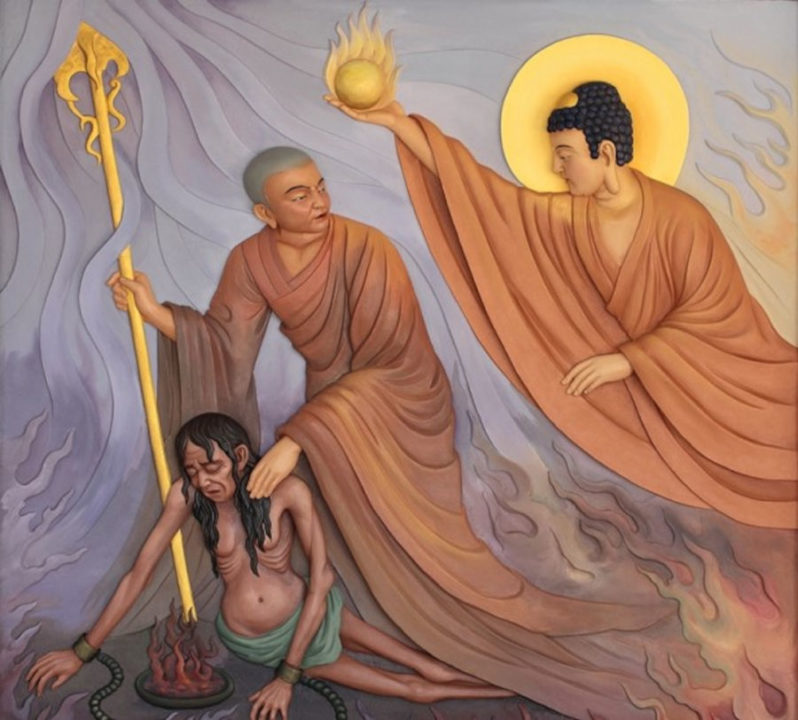
In Taoism, the 15th day of the seventh lunar month is the judgment day for ghosts. It is believed that the judge of the lower realm gathers all spirits together and looks through their records to check who was kind or evil during their earthly lives. Ghosts with lesser sins would receive forgiveness, while ghosts with serious sins might suffer punishment and not be reincarnated. Ritual ceremonies are performed by the living family members of the ghosts in the hope that the judge offers them mercy.
How to celebrate Hungry Ghost Festival
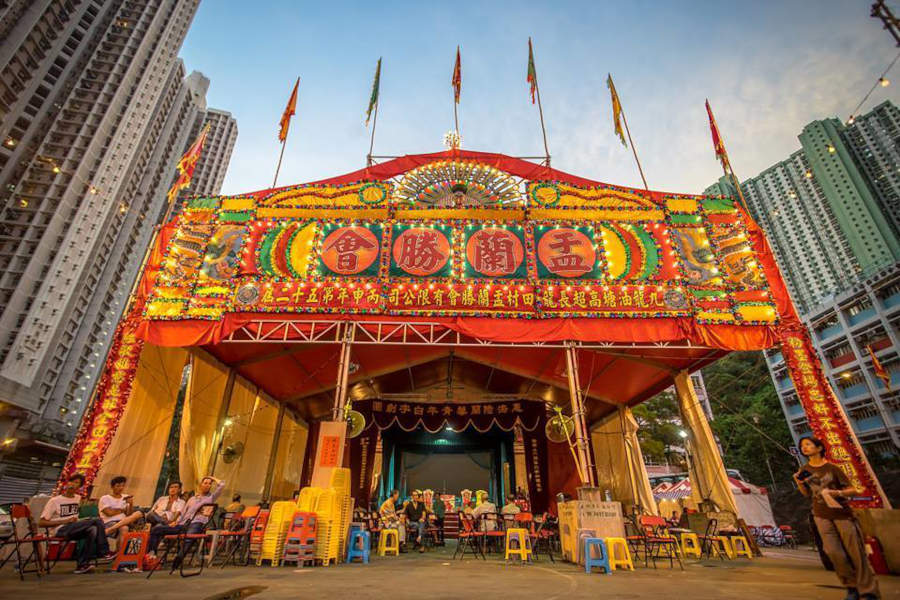
During the Hungry Ghost Festival, rituals and special ceremonies are observed to pay tribute to unknown ghosts to avoid angering them and provoking them to play pranks on the living, but also to show reverence and pay respect to the spirits of your own ancestors. Families usually serve food on the memorial tables in their homes to ask for their ancestors’ blessings as they believe the dead are looking after them in spiritual forms.
Other common rituals people do during this time include burning incense and joss paper, which are paper products such as hell bank notes, clothing, cars, or other things ancestors enjoyed in paper form as a way to transfer them to the afterlife. Crowds gather at night to watch Chinese opera performances held at temporary bamboo structures decorated with lights. People also release paper lanterns on water, signifying guiding the ghosts back to the afterlife.
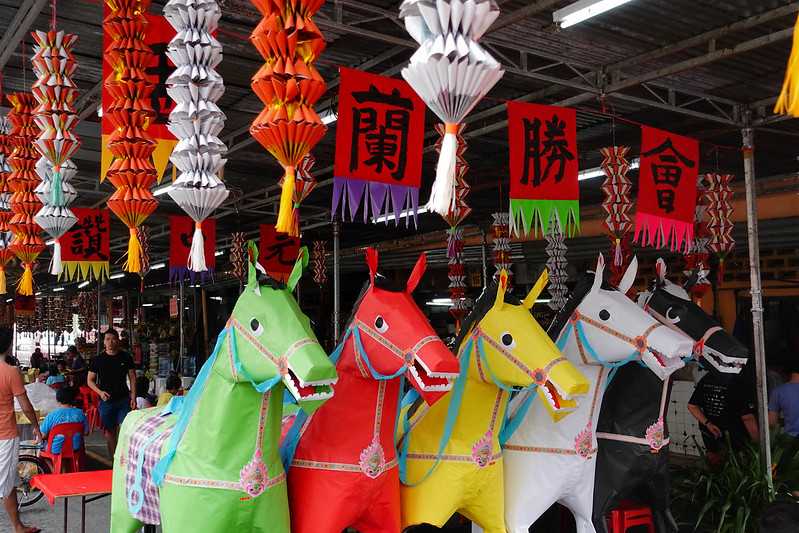
On the festival night, locals have a feast and leave an empty seat at the dining table as a symbol for their lost members. These rituals are believed to calm the ghosts as they wander and allow their ancestors to live a better afterlife.
What to avoid doing during Hungry Ghost Festival
There are certain taboo behaviours people will make sure not to do to avoid provoking the ghosts or incurring bad luck. For example, people usually:
- Avoid telling ghost stories.
- Avoid touching food offerings and apologize if you accidentally knock them over.
- Avoid scheduling significant events during this time, like starting a new business, getting married, or moving into a new home.
- Avoid leaving money on the street as it is believed to be a bribe to the guards at the underworld’s entrance, which will be counted as a mark against you during your final judgement.
- Avoid taking the last transportation of the day.
- Avoid taking photos at night.
- Avoid standing chopsticks upright in your bowl when eating as this considered an invitation to the ghosts.
- Avoid wearing red and black clothing.
- Avoid bodies of water, as a ghost who died drowning may try to do the same to you.
- Avoid sleeping next to or facing a mirror.
- Avoid sitting in the front row of Chinese opera performances; these seats are reserved for spirits.
Hungry Ghost Festival in other Asian countries
Festivals with similar themes and rituals to the Hungry Ghost Festival are also celebrated in other Asian cultures. In Taiwan, the lighting ceremony on grand temporary bamboo structures lasts for a few days during the Zhongyuan Ghost Festival in Keelung to show respect to deceased ancestors. These structures are also the site of operas and grand feasts.
In Japan, similar beliefs and rituals encapsulate the Bon Festival. Japanese people create food offerings named syouryouuma, which are sculptures of cucumbers or eggplants with wooden stick legs made to resemble a horse or cow to symbolize the spirits being transported between two worlds.
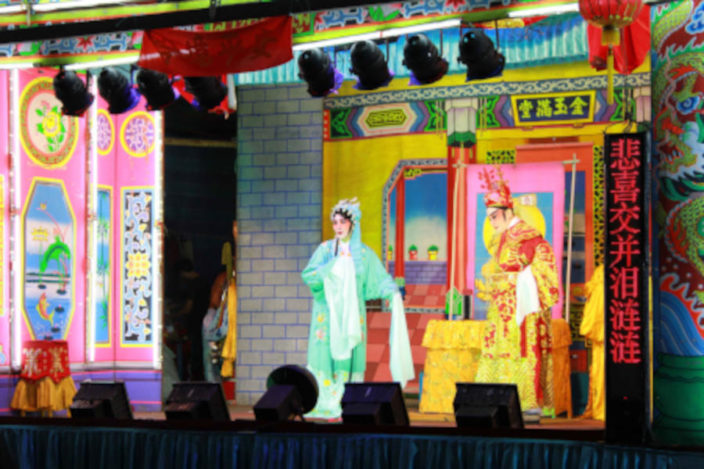
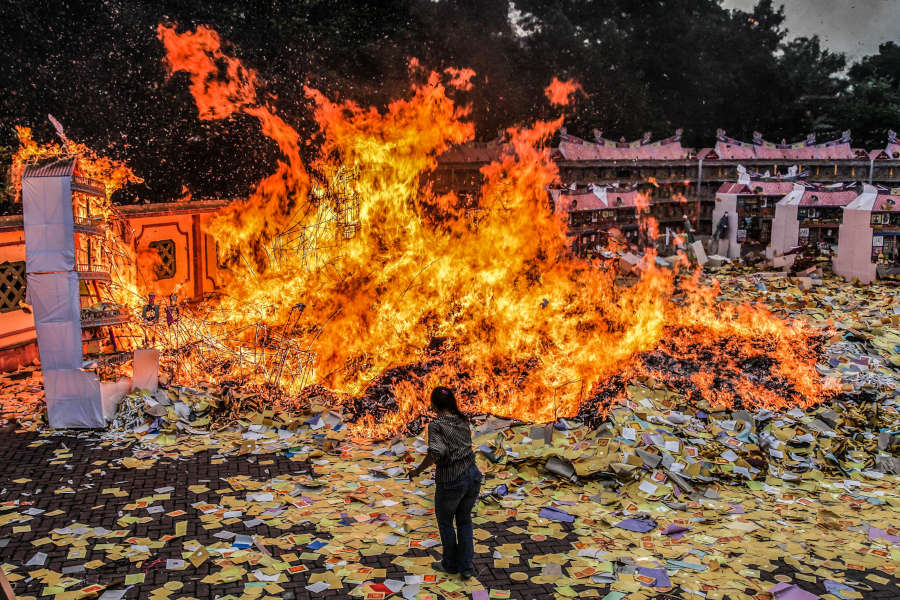
In Indonesia, there is an ancestor worship festival called Ma’nene. Known as a cleansing ritual, locals clean, groom, and dress their ancestors’ corpses with new, expensive clothing as a way to show remembrance to their deceased family members.
Where to see Yulan Festival festivities in Hong Kong
- Victoria Park Hungry Ghost Festival ceremony in Victoria Park, Causeway Bay (August 23, 2023)
- Temple rituals & Chinese opera at Yuen Da Temple, San Ha St, Chai Wan (entire Ghost Month)
FAQ about Hungry Ghost Festival
What is the meaning behind Hungry Ghost Festival?
During the seventh lunar month of the year, Chinese Buddhists and Taoists believe the gateway between the realms of the living and dead open. During this time, people offer gifts and food by way of greeting their passed ancestors, as well as to appease unknown, potentially malicient spirits.
Which countries celebrate Hungry Ghost Festival?
Hungry Ghost Festival, also called Yulan Festival or Zhongyuan Festival, is celebrated by Taoists and Chinese Buddhists in Hong Kong, China, Taiwan, Singapore, and Malaysia. Festivals with similar meanings and traditions also occur in Indonesia and Japan.
Why do Chinese people avoid doing certain things during Hungry Ghost Festival?
People who observe Ghost Festival stray away from behaviours such as stepping over offerings, telling ghost stories, getting married, and wearing red and black clothing to avoid angering or annoying spirits, who may prank or even try to bring bad luck to the living.
Other traditional Chinese festivals: Lunar New Year — Lunar New Year Fair — Birthday of Che Kung — Chinese Lantern Festival — Kwun Yum Treasury Opening Festival — Ching Ming Festival — Tin Hau Festival — Cheung Chau Bun Festival — Buddha’s Birthday — Birthday of Tam Kung — Dragon Boat Festival — Birthday of Kwan Tai — Qixi Festival — Hung Shing Festival — Hungry Ghost Festival — Mid-Autumn Festival — Monkey King Festival — Birthday of Confucius — Chung Yeung Festival — Winter Solstice Festival.
Header image credits: Leung Chee Keung Kenneth via WikiCommons


